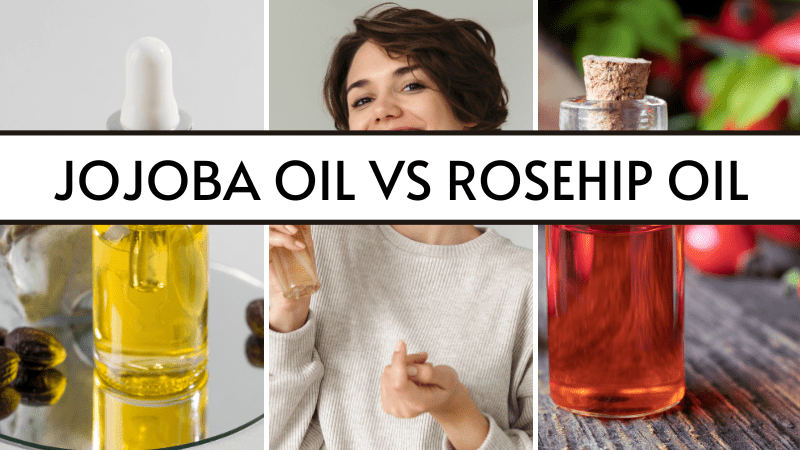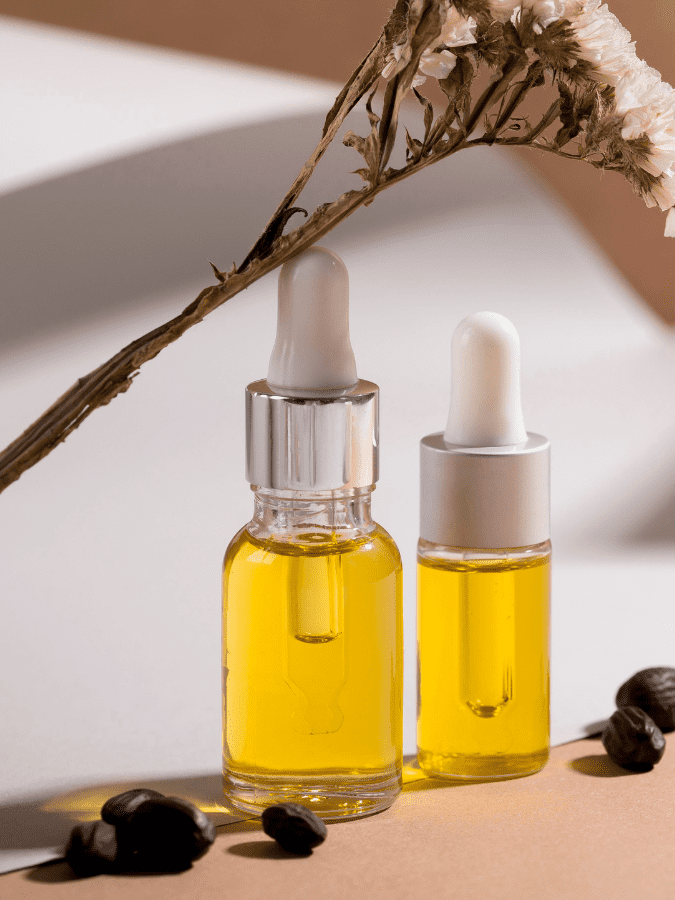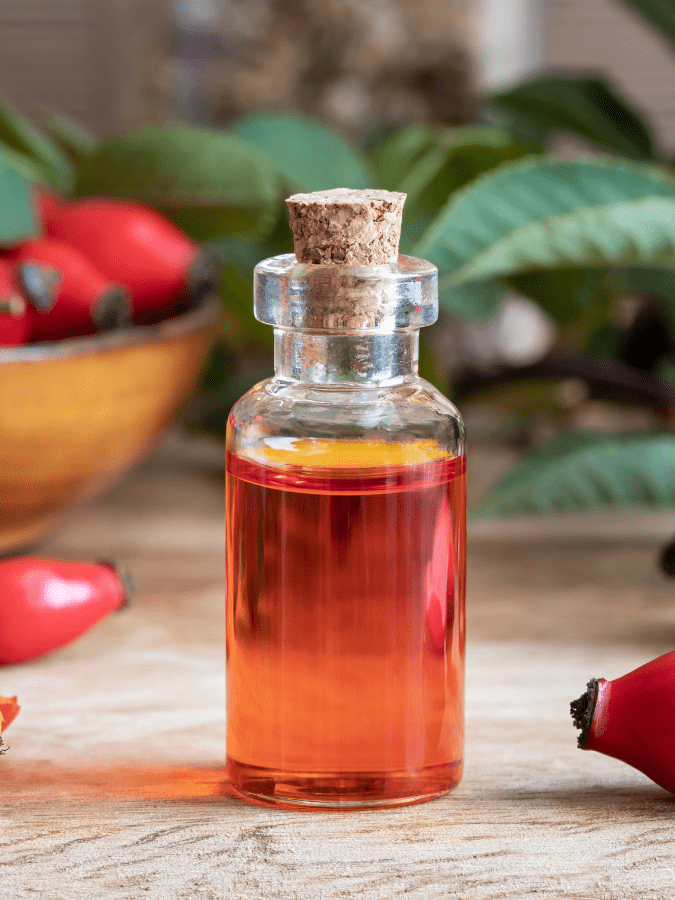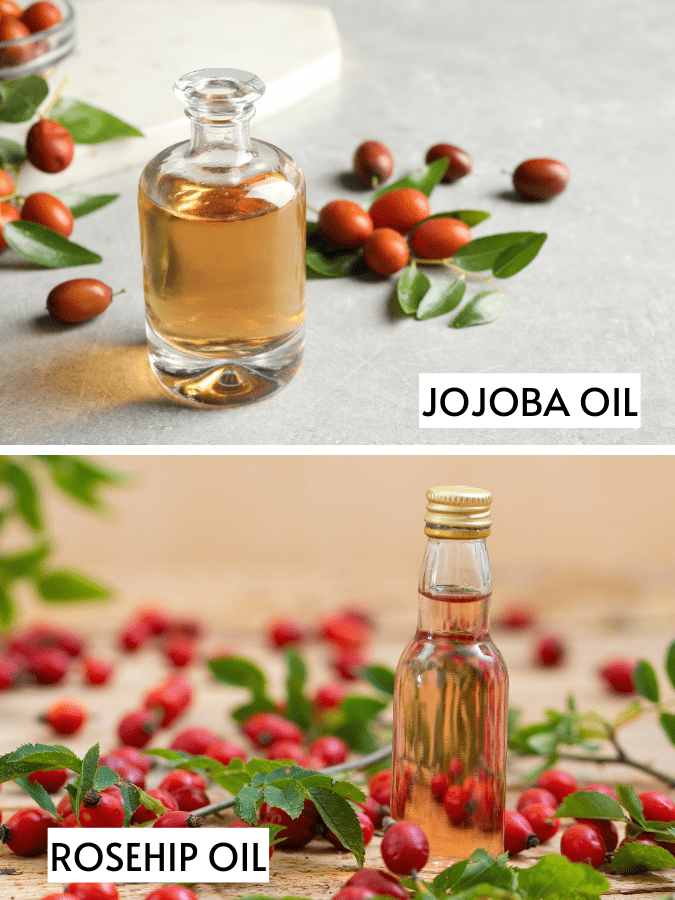Jojoba Oil vs Rosehip Oil – Which is Right for You?

I only recommend products I love and I think you will, too. If you click on links I provide, I may receive a little compensation. Learn more.
Are you trying to decide between jojoba oil and rosehip oil for your skin care routine? Well, you’re in luck!
Are you an avid skincare enthusiast looking for the perfect oil to nourish your skin? Or perhaps you’re just curious about which oils can provide the best results for your skin concerns. Well, I’ve got news for you!
Jojoba oil and Rosehip oil are two of the most popular face oils out there, and it’s time to find out what sets each one apart from the other. In this blog post, we’ll cover all the essential details on jojoba oil vs rosehip oil so that you can easily decide on which one is right for you.
From their composition profiles to their benefits and even tips on how to use them safely – join us as we dive into everything there is to know about these natural plant-based miracles!
Which is better for you, jojoba oil vs rosehip oil?
The Verdict So, should you choose jojoba oil or rosehip oil? Ultimately, the choice depends on your individual needs and preferences. If you have dry or mature skin, then rosehip oil may be a better fit because of its moisturizing properties.
However, if you have acne-prone skin or are looking for an all-around anti-aging treatment, then jojoba oil might be more suitable for you. No matter what your needs are, both of these oils offer excellent benefits for keeping your complexion healthy and happy!
What is jojoba oil?

Jojoba oil is a substance that has been extracted from the seeds of the jojoba plant. It is often used in cosmetics, as it has natural emollient properties that help moisturize and soften skin. It also helps protect against environmental damage and fights bacteria, making it great for acne-prone skin. Plus, it’s even been known to reduce wrinkles!
Benefits of jojoba oil for face and hair
- Contains antioxidants that protect the skin from free radical damage
- Has anti-inflammatory properties to help soothe irritated skin
- Moisturizes and nourishes dry, itchy scalp and hair
- Can reduce dandruff and improve hair texture
- Helps reduce acne scars
- Acts as a natural sunscreen by blocking damaging UV rays
- Is non-comedogenic, meaning it won’t clog pores or cause breakouts
- Easily absorbed into the skin without leaving an oily residue
What is the composition profile of jojoba oil?
Jojoba oil is a highly versatile oil extracted from the seeds of the jojoba plant. It’s composed of long-chain fatty acids, including oleic acid (47-50%), stearic acid (20-25%), palmitic acid (15-19%) and linoleic acid (3-7%). Additionally, jojoba oil contains some other antioxidants like vitamin E and chlorogenic acid.
What is rosehip oil?

Rosehip oil, which comes from the seeds of rose bushes, offers many of the same benefits as jojoba oil. It’s rich in vitamins A and C, which help promote collagen production and improve skin elasticity. It also contains essential fatty acids that help nourish dry or mature skin. Not only does this oil help moisturize and hydrate your skin, but it can also help reduce redness and inflammation caused by acne breakouts.
Benefits of rosehip oil for skin and hair
- Reduces wrinkles and fine lines
- Treats acne breakouts
- Fades hyperpigmentation and dark spots
- Moisturizes skin
- Prevents premature signs of aging
- Provides anti-inflammatory benefits
- Promotes hair growth and thickness
- Helps to soften dry, brittle hair
What is the composition profile of rosehip oil?
Rosehip oil is a natural oil extracted from rose hips, the fruit of the rose plant. It’s composed primarily of fatty acids, including linoleic acid (47-50%), oleic acid (33-38%), palmitic acid (7-15%) and stearic acid (4-6%). Additionally, it contains other antioxidants such as vitamins C, E, and provitamin A.
Are jojoba oil and rosehip oil similar in nature?

Jojoba oil and rosehip oil are two powerhouse ingredients that have been used in skincare routines for centuries. They are similar in many ways, and both offer so many amazing benefits for the skin!
Both of these oils contain antioxidants such as vitamin E and fatty acids, which can help reduce skin irritation, increase moisture retention, and improve complexion and overall tone. They are both deeply moisturizing, calming, and nourishing to the skin and help to protect against environmental pollutants. They can both be used in a variety of different ways, from face oils to body oils and even in hair care products.
What’s the difference between the two?
Jojoba oil is great for treating acne-prone skin and moisturizing oily skin without breaking out, while rosehip oil has natural anti-aging properties that can smooth out fine lines and delay signs of aging. One is for oily skin and the latter for dry skin.
| Properties | Jojoba oil | Rosehip oil |
|---|---|---|
| Origin | Jojoba oil is a liquid wax extract from the seed of the jojoba shrub, native to desert regions of Arizona, California, and Mexico. | Rosehip Oil is extracted from the seeds of rose bushes found mainly in Chile. |
| Color | Jojoba oil is a pale yellow liquid with a mild nutty aroma. It is not known to have any artificial coloring added to it. | Rosehip oil is typically a reddish-orange color due to its high concentration of antioxidant carotenoids. It also has a faint earthy smell, which can vary depending on the brand. |
| Texture | It has a smooth, waxy texture which is lightweight and gets easily absorbed into the skin. | It has a slightly thicker texture than jojoba oil and does not absorb as quickly into the skin. |
| Comedogenity | It has a low comedogenicity rating of 2, which means it won’t likely clog pores or cause breakouts. | It also has a low comedogenicity rating of 1, making it slightly better than jojoba oil. |
| Ideal for | Oily and acne-prone skin types | Normal to dry skin types |
| Drawbacks | Not suitable for people with nut allergies as it comes from a nut. | It can also cause skin irritation for some people with sensitive skin types. |
| Price | Expensive than rosehip | Cheaper |
| Shelf life | It can last up to 2 years | Short shelf life due to high concentrations of vitamin A |
Jojoba oil vs rosehip oil: what to choose for what?
- For Acne: I would pick rosehip oil to eliminate acne as it’s packed with antibacterial properties and skin-nourishing linoleic acid, this all-natural remedy is an amazing choice when it comes to reducing breakouts.
- For oily skin: To combat and nourish oily skin complexion, go for jojoba oil as it resembles your skin’s naturally occurring oil, and your skin will love it, hence trick it to produce less of that. But that doesn’t mean rosehip oil is not great well. It’s just that jojoba oil is slightly better.
- For dry skin: We, of course, cannot let the moisturizing properties of rosehip oil slide but again, jojoba oil is much better at mimicking skin’s natural sebum so it’ll act as an excellent moisturizer.
- For anti-aging: Rosehip oil all the way! In fact, if you could mix and use jojoba and rosehip oil together, there’s no better combination than that for fighting wrinkles and fine lines.
- For hyperpigmentation: The high concentration of vitamin A in rosehip oil makes it ideal for lightening skin complexion and dealing with pigmentation.
- For acne scars: I already love rosehip oil for acne scars, so that’s easy.
Can I use rosehip oil and jojoba oil together?

Absolutely! Jojoba oil and rosehip oil have become a dynamic duo when it comes to skincare. Rosehip oil is full of fatty acids, vitamins C and A, and proteins — all great for restoring youthfulness to the skin. Jojoba oil helps to balance out sebum production, making your skin more hydrated and smoother looking.
Together they can help get that gorgeous glow you’ve wished for! If your skin could talk, I’m sure it would be saying thank you for bringing these two together!
How to use jojoba oil and rosehip oil together?
A good place to start is by combining equal parts Jojoba Oil & Rosehip oil (or whatever ratio works best for you). Mix them together into a bottle or bowl, so they blend nicely. Once combined, apply a few drops onto your face using gentle circular motions until fully absorbed – this allows time for both oils to penetrate deeply into the layers of your skin while providing moisture at all levels. You may also add other oils, such as Argan Oil or Grapeseed Oil, to amplify their benefits if desired!
Conclusion on jojoba oil vs rosehip oil
To sum up everything we’ve talked about – when deciding between jojoba oil vs rosehip oil for your skincare routine, it all comes down to what works best for you! Both provide amazing benefits when it comes to nourishing and protecting your complexion but depending on your individual needs, one might work better than the other.
Take some time to think about what would work best for your unique circumstances, and make sure to consult with an expert if need be – either way, hopefully, this post has given you all the information you need to make an educated decision! Good luck!
Related articles to jojoba oil vs rosehip oil
- The Battle Of The Oils: Marula Vs Rosehip Oil – Which Is Better For You?
- Argan Vs Rosehip Oil, What Should You Use? (You’re Not Ready!)
- The Skincare Showdown: Cream Vs Lotion
- Cleansing Balm Vs Oil: Which Is Better For You?

